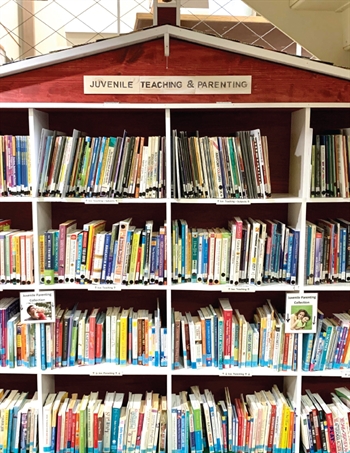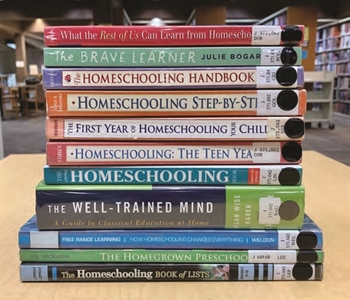December 2020 | Volume XXXVIII. Issue 4 »
Libraries to the Rescue: Providing Homeschooling Support During a Pandemic
December 1, 2020
Jennifer Robertson, Carbondale Public Library
Homeschoolers rely on the resources that public libraries offer to meet their educational and social needs. The COVID-19 pandemic has made helping homeschoolers challenging for libraries even while homeschoolers need more support than ever. Librarians and other professionals across the state have noticed an increase in homeschoolers since the beginning of the school year, as well as the addition of remote schoolers—those “attending” an external school, even if most or all of the learning is currently being conducted virtually—looking for extra support. Sixty percent of respondents surveyed by the author have noticed an increase in homeschoolers since the pandemic began. “Parents need a plan and need to be able to map out the year,” said Jennifer Cernich of Riverton Village Library, “Homeschooling lets them do this so they can work.” There are ways that libraries can be both supportive and welcoming towards homeschoolers within the community, even during a pandemic. Libraries can learn what is working for others and take simple steps to make homeschoolers feel supported.
BOOKS
Books are a great starting point when thinking about adding homeschooling resources to a library collection. Most libraries simply have books that are suitable for children and parents regardless of their homeschool status. Some libraries have books specifically targeted towards homeschooling families. There are books that describe different philosophies that are helpful for those getting started. “We have books to help parents to homeschool their children, but no curriculum materials,” said Brandi Smits from Orland Park Public Library. “We felt that the parents would need them longer than the checkout time and would be better served purchasing their own copies.” Curriculum materials can be costly and take up a lot of space, though some libraries have made this a priority. “We have an entire homeschool Resource Center that we established in 2001 that families from all over the state travel to Johnsburg to visit,” said Beth Ryan of Johnsburg Public Library. This resource center was funded with a grant in 2001 that enabled them to convert a study room into the center.

Other ideas for helpful books include how-to books for parents at every level, books on how to homeschool, and books on different styles of homeschooling. Homeschoolers and their families can also be directed towards information on loaning books from other libraries within the Illinois systems as well as interlibrary loans. Many libraries have parenting or teaching collections that also include materials helpful to homeschoolers. “We have a ‘Parent’ section we incorporated for our homeschool families that has specific literature on homeschooling and options for supplementing curriculum,” said Isabel La Barbera of Berkeley Public Library. “There is also a bin of books and educational games that is kept out of our collection specifically for those families participating in the yearly homeschooling program we offer; families share those resources.” Librarians have to build a collection based upon the needs of their specific community. “We do have some guides for homeschoolers in our parent and teacher section, but we do not have a section especially for them,” said Caitlin Bergan of Glenview Public Library, “We find that a wide variety of parents are interested in supplementing learning at home, so even before COVID, we kept a robust nonfiction section, including work books.”
DIGITAL RESOURCES
Libraries provide subscriptions to their patrons for services that they might not be able to access otherwise. Educational apps such as Tynker, Khan Academy Kids, and ABCmouse are provided in some libraries with free subscriptions or access for patrons. Evergreen Park Public Library offers their patrons Brainfuse, a tutoring service that provides help with such things as writing papers and doing homework. LaGrange Park Public Library offers reference and history databases, readers advisory databases, Mango for Foreign language learning, and Tumblebooks which provides a variety of e-books for children and teens. Many libraries have ebooks and audiobooks available from apps such as hoopla digital, Libby, and cloudLibrary. There are even research databases geared towards children and young adults.
The Urbana Free Library offers access to databases including Early World of Learning, Novelist K-8 Plus, and World Book Kids. “We have a wide range of digital resources for patrons, including eBooks; eAudiobooks; Live Homework Help from Tutor.com; Mango Languages; research databases; and streaming through Hoopla, Kanopy, and Acorn TV,” said Lorrie Hansen of Skokie Public Library. The goal is to find a combination of digital resources that meets the needs of a specific community and fits in with the libraries overall budget. Digital resources do not have to be purchased specifically for the homeschooling community but homeschoolers can be directed towards them.
HANDS-ON MATERIALS
Homeschoolers need hands-on materials to engage them in learning. Libraries can help offset this cost by offering a variety of circulating materials that homeschoolers can use. This can include math manipulatives, STEAM kits, literacy kits, preschool kits, maps, science equipment, educational games, IDNR nature resource backpacks, and more. “We have a variety of kits including literacy and math, and science equipment like 3D models, telescopes, and microscopes for checkout,” said Lauren Chambers of the Urbana Free Library. “We also have a collection of musical instruments that can be checked out ranging from a keyboard to sets of small drums, bells, and guitars. Instruments are packaged with learning materials like teacher guides.”
STEAM materials can be particularly cost prohibitive for families, so some libraries purchase these items to be circulated. The Matteson Area Public Library has Dash Robot, 3D pens, Cubelets, Snap Circuits, and microscopes available. STEAM kits are a way that libraries can create learning experiences for their younger patrons. Skokie Public Library has STEAM kits on such subjects as robotics, music, measurement, fossils, coding, and more, with accompanying short YouTube videos that provide an overview of the kits. Circulation of these items vary depending on the library, with some allowing them to be borrowed by those with reciprocal access and others only allowing cardholders to use the materials.

LIBGUIDES OR RESOURCE PAGES
Many libraries do not have room for an entire section dedicated to homeschooling but can bring together all of their available resources by creating a guide or resource page. These types of guides are often digital, which is especially helpful during a pandemic, but can also be found as a handout within the library. Elmhurst Public Library has a page on their website titled “Homeschool Resources at EPL” outlining programs, websites, Illinois resources, and magazines geared towards homeschoolers. Carol Stream Public Library’s homeschooling resources web page also includes available books on the subject of homeschooling that can be found within the catalog and checked out. The Carbondale Public Library has links to various digital resources, books, events, and organizations. “We have a page on our website that has homeschooling curriculum guides, books for homeschooling parents, homeschooling methods, legal resources for homeschoolers, and local homeschooling groups,” says Brandi Smits of Orland Park Public Library, “We also made informational Homeschooling 101 videos that are available on the webpage.” Libraries can easily put together a guide for homeschoolers highlighting the resources in their library as well as resources for the greater community in which they live.
PROGRAMMING
Library programming helps fill a need in the homeschooling community for socialization and educational activities. Some libraries offer programming for homeschoolers while others include homeschoolers in their overall programming for children and young adults. “We offer programming twice weekly for our homeschool families,” said Kary Henry of Deerfield Public Library, “One program is for children ages 7-10, and the other is for children ages 11-14. These programs are of three varieties: Homeschool Hangout (social time, games, escape rooms, etc.), Homeschool Book Club (Bluestem and Caudill book clubs for the Illinois Readers’ Choice Awards), and Homeschool @ the Library (curricular-based programs).”
Project Next Generation (PNG), a grant-funded initiative by the Illinois Secretary of State for children age, has been used by many homeschooling families as a way to supplement STEAM. During the pandemic many libraries have brought PNG online in a virtual format. The Carbondale Public Library has been using Zoom and Discord as a way for older children and teens to connect. YouTube videos of activities along with technology items being checked out provide a way for PNG to continue while in-person programs are on hold.
Younger children can enjoy virtual crafts and story times online with their favorite librarians. “Our library’s YouTube channel features librarian storytimes, BOOMbox at Home activities, book chats, and other educational videos that may be of interest to homeschool families,” said Lorrie Hansen of Skokie Public Library. Many performers brought their children’s programming virtual, which has allowed families to enjoy them from home. Downer’s Grove Public Library has offered virtual puppet shows, for example. Reading challenges are another tool that libraries are using to keep homeschoolers and other patrons actively reading while they are spending more time at home. The homeschooling community benefits from a wide variety of programs on different topics offered for various age ranges.
SUPPORT GROUPS
Support groups for homeschoolers and their caregivers have provided a lifeline for many during the COVID-19 pandemic. These groups can take place online via Zoom or another video conferencing service to provide connection and resources to parents. Aside from the time and staff needed to set up and moderate a group, this can be a fairly easy way to offer support to the homeschooling community. “We recently produced a series of three Homeschooling 101 videos to support families exploring the learning options for their children. Our library is also offering a weekly Zoom Homeschool Discussion group for parents,” said Monica Dzierzbicki of Indian Prairie Public Library District.
Some caregivers are considering homeschooling for the first time and don’t know where to start. A support group can be helpful during the transition into a new way of educating children. “We definitely have had people consider it for the first time since they were in effect going to be homeschooling anyway,” said Beth Ryan of Johnsburg Public Library. “Our volunteer holds informative programs bi-monthly. Pre-COVID she averaged 8-12 people; this summer she had upwards of 125 participants at most sessions (held via Zoom).” Holly Eberle of Algonquin Area Public Library District created a ‘Homeschool for Newcomers’ YouTube video to provide support. “My webinar has the most views of all of AAPLD’s virtual programs,” said Eberle, “In August, a significant percentage of the reference questions I took and overheard my colleagues taking were regarding homeschooling options and non-public school options.”
FINAL THOUGHTS
Helping homeschoolers does not require a huge budget or a staff person with specific skills, but rather the knowledge that homeschoolers exist in every community and might need extra support during this time. Being aware of the needs of the homeschoolers in your community and working to address those needs can go a long way in creating long-lasting relationships. Keep homeschoolers on your radar and they will reward you with lifelong library use.
ACKNOWLEDGEMENTS
The author would like to thank the various libraries who took the time to share their experiences for this article.

 iREAD Summer Reading Programs
iREAD Summer Reading Programs Latest Library JobLine Listings
Latest Library JobLine Listings